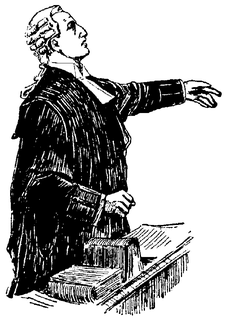Ross Ray QC was an Australian barrister and the President of the Law Council of Australia. [1]

A Queen's Counsel, or King's Counsel during the reign of a king, is an eminent lawyer who is appointed by the monarch to be one of "Her Majesty's Counsel learned in the law." The term is recognised as an honorific. The position exists in some Commonwealth jurisdictions around the world, but other Commonwealth countries have either abolished the position, or re-named it to eliminate monarchical connotations, such as "Senior Counsel" or "Senior Advocate". Queen's Counsel is an office, conferred by the Crown, that is recognised by courts. Members have the privilege of sitting within the bar of court.

A barrister is a type of lawyer in common law jurisdictions. Barristers mostly specialise in courtroom advocacy and litigation. Their tasks include taking cases in superior courts and tribunals, drafting legal pleadings, researching the philosophy, hypothesis and history of law, and giving expert legal opinions. Often, barristers are also recognised as legal scholars.
The Law Council of Australia, founded in 1933, is an association of law societies and bar associations from the states and territories of Australia, and the peak body representing the legal profession in Australia. The Law Council represents more than 65,000 lawyers across Australia[] and has its national base in Canberra.
Ross Ray studied at Monash University, where he obtained a Bachelor of Jurisprudence and a Bachelor of Laws, graduating in 1975. [2]

Monash University is a public research university based in Melbourne, Australia. Founded in 1958, it is the second oldest university in the State of Victoria. The university has a number of campuses, four of which are in Victoria, and one in Malaysia. Monash also has a research and teaching centre in Prato, Italy, a graduate research school in Mumbai, India and a graduate school in Suzhou, China. Monash University courses are also delivered at other locations, including South Africa.
The Bachelor of Laws is an undergraduate degree in law originating in England and offered in Japan and most common law jurisdictions—except the United States and Canada—as the degree which allows a person to become a lawyer. It historically served this purpose in the U.S. as well, but was phased out in the mid-1960s in favor of the Juris Doctor degree, and Canada followed suit.
He practised in a range of areas and participated in some of Australia's most well known cases. [3] Ray was Chair of the Victorian Bar in 2004 and 2005.
He appeared in many major coronial investigations and Royal Commissions, including the Grand Prix death at Albert Park.
Grand Prix motor racing, a form of motorsport competition, has its roots in organised automobile racing that began in France as early as 1894. It quickly evolved from simple road races from one town to the next, to endurance tests for car and driver. Innovation and the drive of competition soon saw speeds exceeding 100 miles per hour (160 km/h), but because early races took place on open roads, accidents occurred frequently, resulting in deaths both of drivers and of spectators.

The Melbourne Grand Prix Circuit is a street circuit around Albert Park Lake, only a few kilometres south of central Melbourne. It is used annually as a racetrack for the Formula One Australian Grand Prix, Supercars Championship Melbourne 400 and associated support races. The circuit has FIA Grade 1 licence. In spite of being a circuit on public roads it has characteristics of a natural road course considering it being fast and flowing combined with extensive runoff in many corners.
His wife, Mara, is also a Victorian barrister.
Ross Ray died on 22 May 2016 in a quad bike accident at his hobby farm near Mansfield, Victoria. [4]
